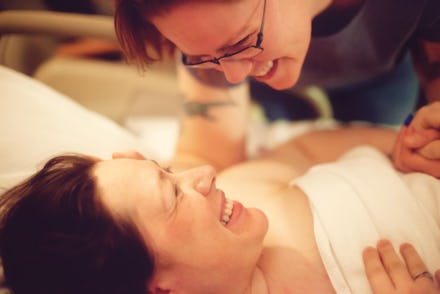A Troubling New Report Reveals the True Cost of Being Gay in America

Marriage inequality isn't just a social injustice — it's a financial one, too.
Just ask 67-year-old Arlene Goldberg. The South Florida resident was kicked out of her home after her wife of 47 years died because she wasn't entitled to her wife's Social Security benefits. Without that extra money, she couldn't afford to pay the mortgage.
"I'm trying to figure out how I am going to get through this time," she told NBC News. "I really can't even pay my bills."
She's not alone. A new report details how an untold number of lesbian, gay, bisexual and transgender people are facing financial distress because they don't enjoy the same legal protections of straight married couples.
The research. The Movement Advancement Project and Center for American Progress examined census data and Gallup polls and revealed stunning statistics about the financial hardship that gay people face in the United States. It paints a bleak picture that should eliminate the stereotype that gay people are in better shape financially.
For starters, children of same-sex couples made about $10,000 less per year compared with heterosexual couples in states where same-sex marriage is banned. In contrast, parents make about about the same in states where same-sex marriage isn't banned.
Also, LGBT adults who are raising their kids alone are three times more likely to have incomes at or near the poverty line compared with heterosexual people — and, judging by these charts, it's a huge problem:
As you can see in the map below, "low-equality" states (mainly in the southeast), the median household income for same-sex couples is very low. Although poverty is higher in general, evidence suggests "that LGBT people in low-equality states are disproportionately more likely to be poor than non-LGBT people in their states."
Why? Blame the archaic laws. LGBT families aren't entitled to the same rights as their heterosexual counterparts, which creates a financial nightmare. ThinkProgress observes:
When LGBT families are not legally recognized through marriage, it impedes their access to health insurance, tax benefits, retirement planning, and other safety-net programs. They thus pay more for insurance, shell out extra for legal assistance to obtain protections through other means, and face more liability for protecting their families in emergency situations.
Besides legal discrimination and lack of recognition, a hostile education environment (i.e. bullying) creates problems later in life. LGBT people are less likely to pursue educational opportunities like college that as a result means they will be earning less income in life.
There may be relief ahead. Nineteen states and the District of Columbia have legalized same-sex marraige, which means 44% of the U.S. population lives in a state where same-sex couples enjoy the same marriage benefits as straight coupes.
"The momentum of recent court rulings overturning marriage bans across the country has created the impression that LGBT Americans are on the cusp of achieving full equality from coast to coast," the organization said in a press release.
Ineke Mushovic, the executive director of MAP, told NBC News that these anti-gay laws create "indisputable economic impact."
"There is a pervasive myth that LGBT people are more affluent than the general population," she said. "When you're thinking about anti-LGBT laws, people don't really understand the real consequences that has on people's survival, their ability to put food on the table, the ability to pay the rent."